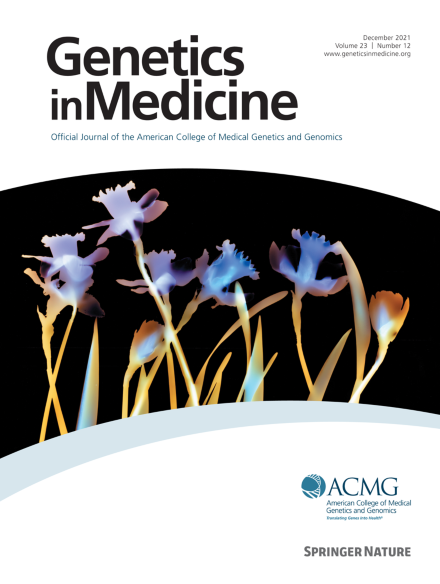Management of individuals with heterozygous germline pathogenic variants in ATM: A clinical practice resource of the American College of Medical Genetics and Genomics (ACMG)
IF 6.6
1区 医学
Q1 GENETICS & HEREDITY
引用次数: 0
Abstract
Purpose
ATM germline pathogenic variants (GPVs) are associated with a moderately increased risk of female breast cancer, pancreatic cancer, and prostate cancer. Resources for managing ATM heterozygotes in clinical practice are limited.
Methods
An international workgroup developed a clinical practice resource to guide management of ATM heterozygotes using peer-reviewed publications and expert opinion.
Results
Although ATM is a moderate (intermediate) penetrance gene, cancer risks may be considered as a continuous variable, influenced by family history and other modifiers. ATM GPV heterozygotes should generally be offered enhanced breast surveillance according to their personalized risk estimate and country-specific guidelines and, generally, risk-reducing mastectomy is not recommended. Prostate cancer surveillance should be considered. Pancreatic cancer surveillance should be considered based on assessment of family history, ideally as part of a clinical trial, with existence of country-specific guidelines. For ATM GPV heterozygotes who develop cancer, radiation therapy decisions should not be influenced by the genetic result. Although poly-adenosine diphosphate ribose polymerase inhibitors are licensed for use in metastatic castration-resistant prostate cancer and ATM GPVs, the evidence-base is currently weak.
Conclusion
Systematic prospective data collection is needed to establish the spectrum of ATM-associated cancer and determine the outlines of surveillance, response to cancer treatment, and survival.
ATM中杂合子种系致病变异个体的管理:美国医学遗传学与基因组学学院(ACMG)的临床实践资源。
目的:ATM种系致病变异(gpv)与女性乳腺癌、胰腺癌和前列腺癌的风险适度增加有关。临床实践中管理ATM杂合子的资源是有限的。方法:一个国际工作组利用同行评审的出版物和专家意见开发了一套临床实践资源来指导ATM杂合子的管理。结果:虽然ATM是一个中等外显率基因,但癌症风险可能被认为是一个连续的变量,受家族史和其他修饰因素的影响。ATM GPV杂合子通常应根据其个性化的风险评估和国家具体指南提供加强的乳房监测,通常不建议进行降低风险的乳房切除术。应考虑前列腺癌监测。胰腺癌监测应考虑基于家族史的评估,最好是作为临床试验的一部分,并有具体的国家指南。对于发生癌症的ATM GPV杂合子,放射治疗的决定不应受遗传结果的影响。尽管多腺苷二磷酸核糖聚合酶抑制剂被批准用于转移性去势抵抗性前列腺癌和ATM gpv,但目前证据基础薄弱。结论:需要系统的前瞻性数据收集来建立atm相关癌症的谱,并确定监测、对癌症治疗的反应和生存的轮廓。
本文章由计算机程序翻译,如有差异,请以英文原文为准。
求助全文
约1分钟内获得全文
求助全文
来源期刊

Genetics in Medicine
医学-遗传学
CiteScore
15.20
自引率
6.80%
发文量
857
审稿时长
1.3 weeks
期刊介绍:
Genetics in Medicine (GIM) is the official journal of the American College of Medical Genetics and Genomics. The journal''s mission is to enhance the knowledge, understanding, and practice of medical genetics and genomics through publications in clinical and laboratory genetics and genomics, including ethical, legal, and social issues as well as public health.
GIM encourages research that combats racism, includes diverse populations and is written by authors from diverse and underrepresented backgrounds.
 求助内容:
求助内容: 应助结果提醒方式:
应助结果提醒方式:


